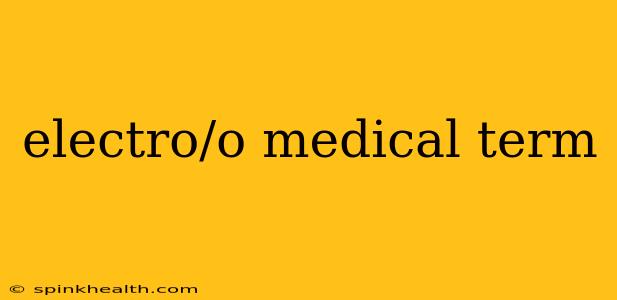Decoding the Mysterious World of "Electro/o" in Medical Terminology
Have you ever encountered a medical term with "electro/o" in it and felt a surge of confusion? You're not alone! This prefix, derived from the Greek word "elektron" (meaning amber, due to its early association with static electricity), signifies a connection to electricity or electrical processes within the body. Understanding its meaning is crucial for anyone navigating the world of healthcare, whether you're a medical professional, a student, or simply someone curious about medical terminology.
Let's embark on a journey to decipher the secrets of "electro/o" and its many applications in medical vocabulary. We'll explore its various uses and answer some frequently asked questions that often pop up when encountering this prefix.
What Does Electro/o Mean in Medical Terms?
At its core, "electro/o" signifies a relationship to electricity. In medical contexts, this translates to the study, application, or effects of electricity on the body. This isn't just about shocking someone; it encompasses a broad range of diagnostic and therapeutic techniques. Think electrocardiograms (ECGs) that record the heart's electrical activity, or electrosurgery, which utilizes electrical currents to cut and cauterize tissue. The prefix implies an active involvement of electricity in a medical procedure or condition.
What are Some Examples of Medical Terms Using "Electro/o"?
The versatility of "electro/o" is reflected in its use across various medical specialties. Here are a few prominent examples:
-
Electrocardiogram (ECG or EKG): This ubiquitous test measures the electrical activity of the heart, providing invaluable insights into its rhythm and function. The "electro" refers to the electrical signals, while "cardio" pertains to the heart, and "-gram" signifies a recording.
-
Electroencephalography (EEG): Similar to an ECG, but for the brain. An EEG records the brain's electrical activity, helping diagnose conditions like epilepsy or sleep disorders.
-
Electromyography (EMG): This test assesses the electrical activity of muscles and the nerves controlling them, aiding in diagnosing neuromuscular disorders.
-
Electroconvulsive therapy (ECT): A treatment for severe depression and other mental illnesses that involves inducing controlled seizures using electric currents. While controversial, it can be life-saving for individuals unresponsive to other therapies.
-
Electrolyte: These are minerals in your blood and other body fluids that carry an electric charge. Sodium, potassium, calcium, and chloride are all electrolytes essential for proper bodily function. The "electro" signifies their charged nature.
How is "Electro/o" Different from Other Similar Prefixes?
While "electro/o" focuses on electricity's role, other prefixes might describe related but distinct concepts:
-
Neuro-: Pertaining to the nervous system, often overlapping with "electro" in contexts like neurophysiology or neurology, as nerve impulses are electrical signals.
-
Myo-: Relating to muscles, often paired with "electro" to describe muscle activity (EMG).
-
Cardio-: Pertaining to the heart, as seen in ECG.
What Are Some Common Misconceptions About "Electro/o"?
A common misconception is that "electro/o" always implies a shocking or harmful application of electricity. While ECT does involve inducing seizures, many other "electro" terms describe non-invasive diagnostic techniques like ECGs or EEGs that are safe and painless.
Where Can I Learn More About Medical Terminology?
Numerous resources are available for anyone wanting a deeper dive into medical terminology. Medical dictionaries, online courses, and textbooks offer comprehensive information and provide a more structured approach to learning this complex yet fascinating language.
This exploration of "electro/o" hopefully sheds light on this important medical prefix. By understanding its meaning and usage, you can navigate medical information with greater confidence and appreciation for the intricate connection between electricity and human health. Remember, always consult with a healthcare professional for any medical concerns.

